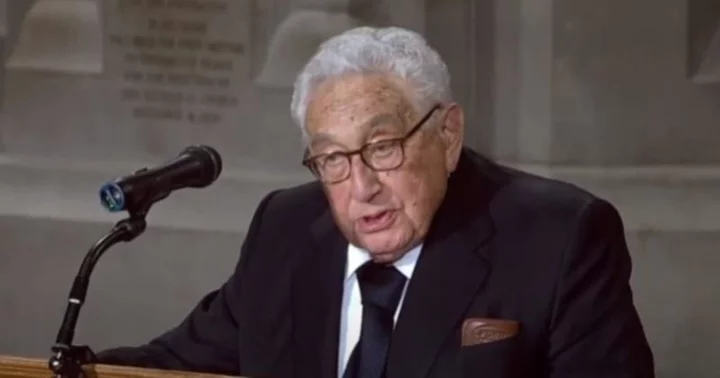KENT, CONNECTICUT: Henry Kissinger, the eminent former US Secretary of State who played a pivotal role in shaping foreign policy during the presidencies of Richard Nixon and Gerald Ford, has died at the age of 100.
His consulting firm announced that Kissinger passed away at his residence in Connecticut.
In a statement, Kissinger Associates admitted, “Henry Kissinger, a respected American scholar and statesman, died today at his home in Connecticut.”
Kissinger underwent a divorce from his first wife, Ann Fleischer, in 1964.
Subsequently, in 1974, he married Nancy Maginnes, who served as an aide to New York Governor Nelson Rockefeller.
From his first marriage to Ann Fleischer, Kissinger had two children.
How did Henry Kissinger die?
As of now, the details surrounding the death of Henry Kissinger have not been disclosed.
Born as Heinz Alfred Kissinger in May 1923, he and his family moved to the United States in 1938 to escape the Nazi campaign targeting European Jews.
Changing his name to Henry, he became a naturalized US citizen in 1943.
Settling in Washington Heights on Manhattan's Upper West Side, Kissinger enrolled in the local public high school.
He served in the Army in Europe during World War II and later attended Harvard University on a scholarship, earning a master's degree in 1952 and a doctorate in 1954. For the next 17 years, he was a member of Harvard's faculty.
Kissinger's career took a prominent turn when he served in various roles within presidential administrations.
However, his last official role in a presidential administration was in 1977. Despite this, he maintained a relationship with George W. Bush.
In 2002, President Bush selected Kissinger to lead a commission investigating the September 11, 2001, attacks.
However, Kissinger stepped down from the position, citing concerns about disclosing the clients of his consulting business.
The circumstances surrounding his recent passing are awaited as the details remain undisclosed at this time.
Henry Kissinger’s last interview on Israel-Hamas conflict
Henry Kissinger's influence as the primary architect of US foreign policy diminished following Richard Nixon's resignation in 1974.
Despite this, he remained a significant diplomatic figure during President Gerald Ford's tenure and continued to express strong opinions throughout his life, actively engaging in politics beyond his 100th birthday in May of this year.
As recently as October 11, 2023, Kissinger commented on the conflict in Israel and Gaza, criticizing European cities like Berlin for hosting pro-Palestine rallies and suggesting that Germany had allowed too many foreigners into the country.
In his last interview, conducted just under two months ago with Germany's Welt TV, Kissinger stated, “It was a grave mistake to let in so many people of totally different culture and religion and concepts, because it creates a pressure group inside each country that does that.”
He expressed that it was “painful” at the sight of people in Berlin celebrating Hamas' assault on Israel on October 7.









